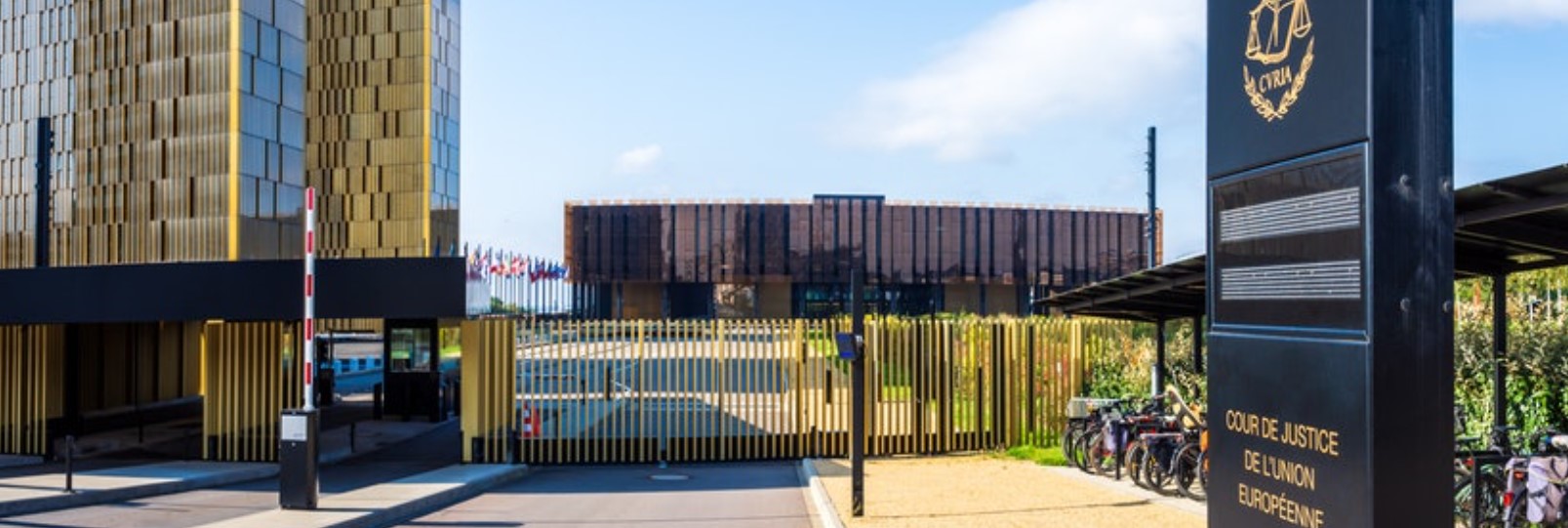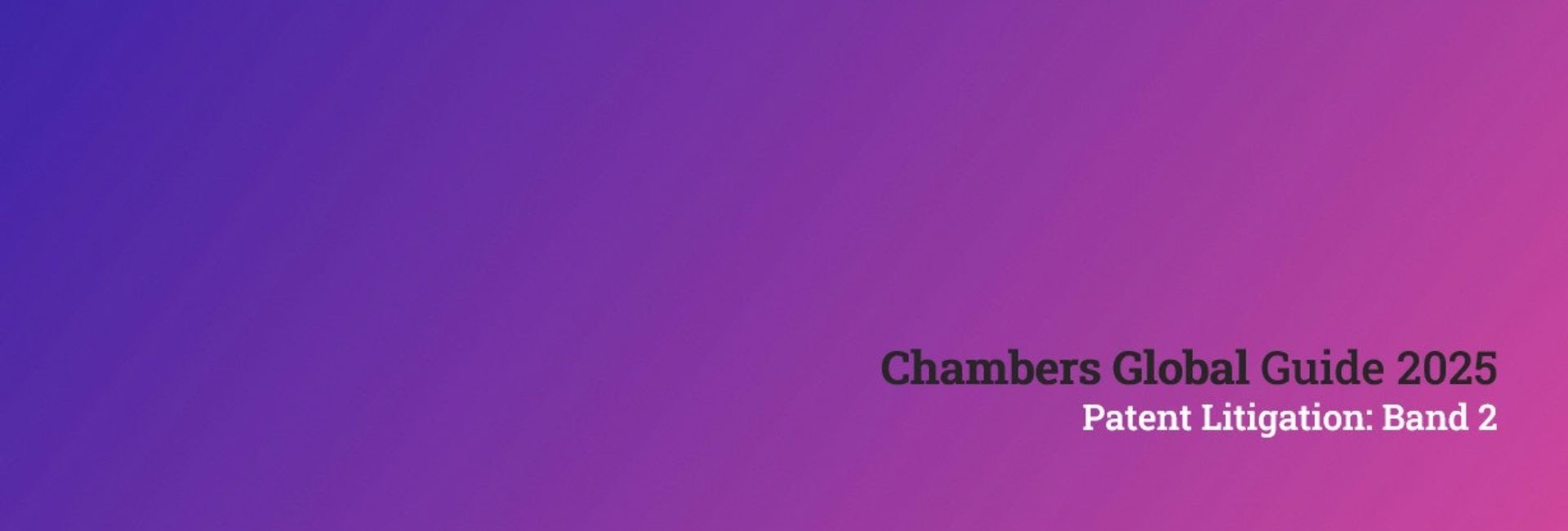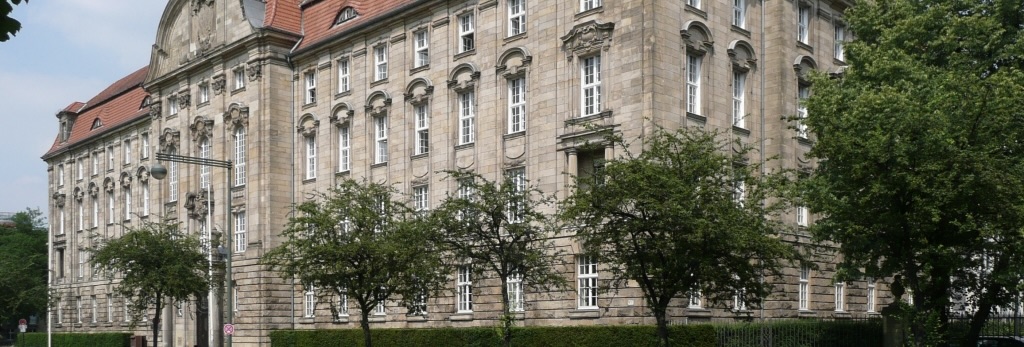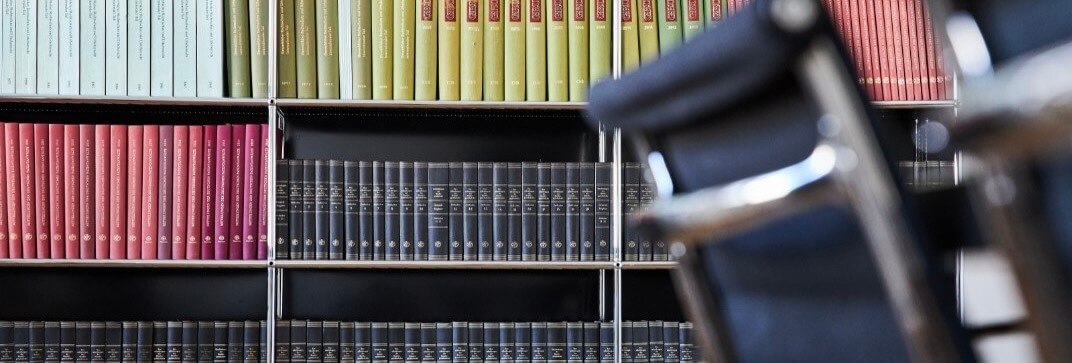
Latest News.
Jurisdiction of the European courts in cross-border patent infringements – ECJ BSH v Electrolux
Another landmark decision by the ECJ on the international jurisdiction of the courts of the EU member states is causing a huge stir as of late. On 25 February 2020, the ECJ published its long-awaited decision in the case BSH Hausgeräte vs Electrolux (C-339/22).
Background and questions referred
The starting point for the request for a preliminary ruling to the ECJ is a patent infringement case in Sweden. In 2020, BSH Hausgeräte GmbH filed a complaint there against Electrolux AB for infringement of all national elements of a European patent. The patent in suit was validated in Germany, Greece, Spain, France, Italy, the Netherlands, Austria, Sweden, the United Kingdom and Turkey.
Elektrolux objected to the admissibility of the complaint relating to infringement of the national parts, with the exception of the Swedish one. The core of the complaint was the objection that the non-Swedish patents were invalid and that the Swedish court therefore had no jurisdiction to rule on the infringement.
At the end of 2020, the court declared that it lacked jurisdiction for all non-Swedish patents on the basis of Art. 24 No. 4 Brussels Ia Regulation. BSH then filed an appeal against this. The Court of Appeal itself also bared doubts concerning the jurisdiction of the Swedish courts especially in light of the exception in Art. 24 No. 4 Brussels Ia Regulation.
Art. 24 No. 4 Brussels Ia Regulation provides an exception to the principle of the jurisdiction of the courts of the Defendant’s state of domicile (Art. 4 Brussels Ia Regulation). It stipulates that, the courts of the member state for which the European patent was granted have exclusive jurisdiction for proceedings “concerned with the […] validity of patents […]” irrespective of domicile. According to the further wording of the regulation, this jurisdiction applies “irrespective of whether the issue is raised by way of an action or as a defence”.
Based upon this background, the Swedish court of appeal stayed the proceedings and referred three questions to the ECJ for a preliminary ruling (summarised by the author).
1. Does a national court which has jurisdiction under Article 4 para. 1 Brussels Ia Regulation lose its jurisdiction to rule on the infringement action if the defence of invalidity of the patent in suit is raised or does the court merely lack jurisdiction to rule on the defence itself?
2. Does Art. 24 No. 4 Brussels Ia Regulation apply to third countries (non-EU)?
3. Can a national regulation affect the interpretation of Art. 24 No. 4 Brussels Ia Regulation?
The answers to questions 1 and 2 are likely to be highly relevant for patent infringement proceedings in the EU.
The decision
Assertion of a patent granted in another EU Member State
The ECJ first deals with the constellation in which the Claimant asserts a different national part of a European patent before the court of the Defendant’s EU domicile and the Defendant raises the defence of invalidity.
The jurisdiction of the court of domicile is based on Art. 4 para. 1 Brussels Ia Regulation, which, however, only establishes jurisdiction subject to the other provisions.
According to Art. 24 No. 4 Brussels Ia Regulation, the courts of the Member State that granted the patent have exclusive jurisdiction to decide on an attack of the validity of the patent, irrespective of whether such an attack is raised by way of an action or as a defence (codification ECJ GAT v LuK, C-4/03).
It follows from the GAT case law that a court dealing with proceedings for infringement of a patent granted by another Member State, in the context of which the validity of the patent is attacked, is not allowed to declare the invalidity of the patent incidentally. It must find that it has no jurisdiction over the question of the validity of the patent.
In addition, the ECJ now had to clarify whether the court of the Defendant’s domicile retains its jurisdiction to decide on the patent infringement action under such circumstances, or whether it must declare to generally have no jurisdiction over the dispute.
This is the point where it becomes intriguing, because the ECJ states that the court of domicile does not lose its jurisdiction over the infringement action. The considerations of the Court are convincing. In addition to the principle that exceptions to principles should be interpreted narrowly, the exception would become the rule if interpreted otherwise. This is because in the majority of patent disputes, the Defendant attacks the validity of the patent in suit. The Defendant would then not only have it in its own hands to withdraw the court’s jurisdiction through its own defence strategy but could also decide when to do so. A duly seized court would then have to declare itself without jurisdiction due to an act of the Defendant. This would lead to the termination of the proceedings due to the lack of a referral option. However, the Brussels Ia Regulation is intended to guarantee legal certainty precisely through a high degree of predictability of the jurisdiction rules.
The ECJ goes on to point out the advantages of its interpretation: This enables owners of IP rights whose IP rights are infringed by the same Defendant in several Member States to bundle their claims and receive comprehensive compensation in a single place of jurisdiction. This also avoids the risk of conflicting decisions.
Anyone who may now think that the ECJ is depriving the Defendants of the defence to attack the validity needs to study the ECJ’s judgment further. This is because it explicitly states that the separation of infringement and validity does not mean that the infringement court must disregard the fact that the Defendant has duly filed an action for revocation in another Member State. If the court of domicile considers that there is a reasonable and non-negligible possibility that the patent will be declared invalid, it may stay the infringement proceedings.
Assertion of a patent granted in a third country
In addition, the ECJ had to decide on the jurisdiction of the court of domicile if the Claimant asserts a patent granted in a third country.
Firstly, the ECJ states that the Brussels Ia Regulation is an internal jurisdiction regulation of the EU. Art. 24 No. 4 Brussels Ia Regulation can therefore not apply nor assign jurisdiction to a court of a third country.
In the absence of special provisions, the jurisdiction to rule on the invalidity defence remains with the court of domicile in accordance with Art. 4 I Brussels Ia Regulation. The Lugano Convention (Norway, Iceland, Switzerland), for example, contains a provision corresponding to Art. 24 No. 4 Brussels Ia Regulation. Bilateral agreements with other third countries may also play a role. If such agreements do not exist, as in the case of Turkey, Art. 33 and Art. 34 Brussels Ia Regulation must also be observed.
Furthermore, the jurisdiction to rule on the invalidity defence remains with the court of domicile according to the ECJ’s decision. According to the ECJ’s findings, this does not violate the principle of non-interference under international law (a state may not interfere in matters that essentially fall within the national jurisdiction of another state). This is because the decision on the validity in the context of a defence in infringement proceedings does not formally have any effect on the actual existence or content of the patent in the third state. According to the ECJ, such a decision only has inter partes effects, as the defence is only aimed at obtaining the dismissal of the complaint and not the revocation of the patent.
Practical effects
As tempting as it may sound to proclaim the simple bundling of all infringement claims before one court, the devil is in the detail.
Firstly, a suitable Defendant is required that is domiciled in the appropriate EU Member State. This Defendant may now be accused of all acts of infringement within and outside the EU. However, they must be acts of infringement by this Defendant. The details of the group structure and the organisation of the distribution chain are of importance here.
Once such a Defendant has been found, the court of domicile can be asked to rule on the patent infringements in several countries. Whether such an action on the Claimant’s side will be successful depends on the Claimant’s own preparation and the reaction of the Defendant. In addition to the presentation of the acts of infringement, the assessment of the infringement and the validity is governed by law of the state for which protection is sought (Art. 8 para. 1 Rome II Regulation). The Claimant must therefore present the infringement in accordance with the law of the granting state and, if necessary, provide evidence in this regard.
Claimants who wish to make use of the ECJ’s new case law must therefore overcome several hurdles, which may incur a heftier or lesser workload. As such it is still necessary to examine very carefully whether the expected effort and the possible delays in infringement proceedings correspond to the interest and economic expectations of the infringement proceedings.
Finally, these principles must now be transferred to the UPC. According to Art. 3 UPCA, the UPCA applies to all EPs with unitary effect and all EPs for which no opt-out has been declared. In this respect, the scope of these IP rights is limited to the contracting member states of the UPCA. These are in turn divided into EU and non-EU states. The court will then proceed as described above. In this respect, the Local Division Düsseldorf has already anticipated the decision of the ECJ in its decision Fujifilm vs Kodak (judgement 28.01.2025, CFI_355/2923) and correctly declared itself competent to decide on the UK part of an EP. However, due to doubts about the legal status of the case, the infringement was no longer relevant (for more on this, see the blog article by my colleague Carsten Plaga).

Latest News.
Chambers Global Guide – Kather Augenstein achieves Band 2 in Chambers Global Ranking 2025
We are excited to share that Kather Augenstein has been ranked in Band 2 for Patent Litigation in the latest Chambers Global 2025 Rankings.
What the team is known for:
Kather Augenstein demonstrates strength in handling complex infringement cases, acting for clients from the technology, life sciences and telecommunications industries. The IP boutique acts in nullity actions, validity proceedings and international parallel proceedings, also assisting clients with FRAND licensing issues. The law firm further advises on distribution issues and related injunctions. It attracts particular attention for its cross-border capabilities, being popular with clients from the USA and Japan.
Strength:
- “Kather Augenstein is a very reliable law firm. The team there have a good knowledge of the new UPC system.”
- “The team at Kather Augenstein do a wonderful job for us, and I know they always put in the same effort no matter how big or small their clients are.”
- “Our lawyers at Kather Augenstein are very approachable and amiable.”
- “Our lawyers at Kather Augenstein provide us with reliable, quick answers and come up with good strategies on how we can progress cases.”
- “Kather Augenstein has highly experienced and motivated professionals who take an extraordinarily thorough approach and are very pleasant to work with.”
We are also proud that three of our partners have earned individual rankings.
- Dr Peter Kather – Senior Statespeople
- Dr Christof Augenstein – Band 2
- Miriam Kiefer LL.M. – Band 4

Latest News.
“Long arm jurisdiction” before the UPC: Local Division Düsseldorf affirms its juristiction for the British part of a European patent
Local Division Düsseldorf, Decision dated 28 January.2025, Fujifilm v Kodak (UPC_CFI_355/2023)
On January 28, 2025, the Düsseldorf Local Division of the Unified Patent Court (UPC) decided on the jurisdiction for a complaint regarding the British part of a European patent in the case UPC_CFI_355/2023. This decision raises significant questions regarding the international jurisdiction of the UPC and its scope with regard to non-UPC member states such as the United Kingdom.
I. Facts of the case
In the underlying complaint, the Claimant asserted patent infringement and sought, among other things, injunctive relief and damages for acts in Germany and the United Kingdom. The Defendants raised a plea of lack of juristiction of the UPC with respect to the UK part of the EP, in particular arguing that Art. 34 UPCA limits the jurisdiction of the UPC to the Contracting States of the UPC. Furthermore, reference was made to the exclusive jurisdiction of British courts under international principles of patent law.
The Defendants filed a counterclaim for revocation of the patent in suit and applied for the patent in suit to be declared invalid in all the Contracting States in which the patent in suit is valid. The Defendants did not file an explicit application for the patent in suit to be declared invalid in the United Kingdom as well.
II. Decision and grounds
The Düsseldorf Local Division affirmed the UPC’s juristiction for the British part of the patent in suit.
The Local Division in Düsseldorf has international jurisdiction under Article 4 of the Brussels I Regulation because all the Defendants are domiciled in Germany. Since the jurisdiction is based on the domicile and not on the actions of the Defendants, the Local Division has also assumed international jurisdiction for actions in third countries. Furthermore, the decision states that Art. 71b of the Brussels I Regulation governs the UPC’s juristiction and expressly includes disputes arising under European patents, even if they relate to non-contracting states. This means that the regulation is not territorially limited to the contracting states. Furthermore, Art. 34 UPCA does not contain any restrictions to the effect that a decision regarding the British part of a European patent is excluded. Art. 34 UPCA would rather only regulate the case if the EP is not validated in the entire territory of the UPC. Art. 34 UPCA does not, however, contain any regulation regarding European patents that are validated outside the territory of the UPC.
Further the Düsseldorf Local Division also dismissed the complaint with regard to the British part of the patent in suit. The court came to the conclusion that one of the grounds for invalidity put forward by the claimant applied and, on the basis of the counterclaim for revocation, declared the German part of the patent in suit to be invalid. In view of this, the court did not issue a decision against the Defendants under the British part of the patent, because the validity of the patent in suit was a prerequisite for the conviction of the Defendants. It was not apparent that the question of validity under British law should be assessed differently.
Subseqeuntly there was no decision on whether the court would have had juristiction over a possible counterclaim for revocation of the British part of the patent in suit, since the Defendants did not extend the counterclaim for revocation to the British part.
The decision emphasizes that the UPC is intended to enable uniform law enforcement, which corresponds to the objective of the UPCA. This applies even if the patent in question is registered in a non-UPC state such as the United Kingdom.
III. In Conclusion
The decision of the Düsseldorf Local Division provides important clarifications regarding the UPC’s juristiction in cases concerning non-contracting states. It strengthens the position of the Unified Patent Court as the central forum for the enforcement of European patents. In terms of its content, the Düsseldorf Local Division follows the principles applied by the national courts in Germany.
Insofar the decision of the Düsseldorf Local Division is correct in any case as the Defendants were not ordered to pay damages under the British part. The infringement of the British part was to be assessed under British law. Under UK law, the Defendants would have been entitled to raise the objection of invalidity. Since the Court declared the German part of the patent in suit tob be invalid and no differences in the validity assessment under UK law were evident, a conviction on this basis was ruled out.
From a strategic point of view, it may therefore be advisable in the future, depending on the individual case, to also assert the British part of a European patent before the UPC. However, it is unclear how the UPC will assess the infringement of a European patent under British law and how this will affect the proceedings and, in particular, the duration of the proceedings. It also remains to be seen whether other Local Divisions or the Court of Appeal will follow this decision.

Latest News.
Court of Appeal: Requirements for the withdrawal of an opt-out under Art 83 (4) UPCA
CoA of the UPC, decision of 12 November 2024, UPC_COA_489/2023 and 500/2023 – AIM Sport Development / Supponor et al.
I. Fact of the Case
The patent in suit had been opted out on 12 May 2023 (during the “sunrise period”). The opt-out was entered on the UPC register on 1 June 2023. On 5 July 2023, the Plaintiff applied to withdraw the opt-out. On the same day, the Plaintiff filed an infringement action regarding the infringement of the patent in suit and an application for provisional measures against the Defendants. The Local Division Helsinki dismissed the infringement action and the application for provisional measures on the grounds that the UPC has no jurisdiction due to its opt-out of 12 May 2023. The withdrawal is ineffective because, at the time of the opt-out and the withdrawal of the opt-out, actions brought in 2020 were still pending before the German national courts.
II. Decision of the Court of Appeal
The Court of Appeal overrules the decision of the court of first instance.
The wording, structure, object and purpose of Art. 83 UPCA lead to an interpretation of the phrase “Unless an action has already been brought before a national court” in Art. 83 (4) UPCA as referring to an action brought before a national court during the transitional regime. Earlier national actions (prior to the entry into force of the transitional regime) are not covered by the restrictions on withdrawal of the opt-out.
The Court of Appeal referred to the rules of interpretation set out in Art. 31 (1) of the Vienna Convention on the Law of Treaties when interpreting Art. 83 UPCA and held that the term “action” in Art. 83 (4) UPCA is not to be construed in isolation but in the context of Art. 83 UPCA as a whole. In this respect, the Court sees no reason to interpret the term “action” in paragraph 4 differently from the term “action” in paragraphs 1, 2, and 3, i.e., as an action brought during the transitional period.
The Court of Appeal stated furthermore that this interpretation is also in concordance with the object and purpose of Art. 83 UPCA.
The possibility of withdrawal of the opt-out pursuant to Art. 83 (4) UPCA aims to enable a patent holder to reverse the consequences of an earlier opt-out and use the new UPC system with its advantages as soon as it has familiarized itself with the functioning of the UPC. The restrictions on the opt-out and withdrawal options under Art. 83 (3) and (4) UPCA intend to prevent an abuse of this system through an inadmissible change of jurisdiction. Given this purpose, the phrase “an action has already been brought before a national court” is to be interpreted as an action brought before a national court after the entry into force of the transitional regime. Abuse is not even possible before the existence of the transitional regime.
At the same time, the Court of Appeal clarified that any other interpretation would contradict the object and purpose of the opt-out and withdrawal system and lead to unequal treatment of holders of patents that have been subject to national proceedings in the past, with the consequence that if a patent holder whose patent had been subject to proceedings before a national court decided to opt-out, it could not withdraw its opt-out, thereby being deprived of the possibility of ever benefiting from the UPC system and its advantages.
Additionally, the Court of Appeal stated that the term “action” in Art. 83 UPCA refers not only to infringement and revocation actions but to all actions mentioned in Art. 32 UPCA for which the UPC has jurisdiction.
III. Conclusion
This decision increases the attractiveness of the UPC to patent holders by allowing them to return to the UPC system under certain conditions, even if their patents were subject to earlier national proceedings and they have opted out of the new system.
Anda Sopona

Latest News.
On the requirements of an imminent patent infringement within the meaning of Art. 62 (1) UPCA
Local Division Düsseldorf, decision dated 06 September 2024, UPC_CFI_165/2024, UPC_CFI_166/2024 – Novartis / Genentech
In proceedings concerning the granting of provisional measures, the Local Division Düsseldorf had to deal with the question of when a patent infringement within the meaning of Art. 62 (1) UPCA is “imminent”.
Facts of the case
The Applicant is the proprietor of the patent in dispute, which relates to a pharmaceutical formula concerning antibody biosimilars. The Defendants belong to a group of companies. The Defendant in the parallel proceedings UPC_CFI_166/2024 is the parent company of Defendants 1) to 7) in proceedings UPC_CFI_165/2024. The parent company holds a 100% share in Defendant 1), which is responsible for marketing and distribution in Europe. Defendant 1) is a 100% shareholder in Defendants 2) to 7). The parent company has developed a biosimilar product containing the antibody omalizumab (hereinafter “attacked embodiment”), the phase III clinical trial of which was based on a settlement with the Applicant’s product containing the patented formula. Between July and October 2023, the Defendants filed actions for revocation of the patent in suit in several countries. In November 2023, a representative of the Defendant stated in a Korean healthcare news portal that the Defendant’s goal was to be the first company to supply this antibody biosimilar to major countries. Shortly thereafter, the Applicant sent an authorization enquiry to the Defendants. The Defendants replied that their product did not make use of the teaching of the patent in suit. Furthermore, the patent in suit was not legally valid. On 25 March 2024, the parent company published a press release in which it expressed its intention to launch the product on the European market as soon as possible if the European marketing authorization was granted. In the same month, the Defendants took part in a trade fair in Belgium, where they offered information about the attacked embodiment at their booth. On 10 April 2024, Defendant 2) sent an email to a potential customer informing it about the positive signal for an imminent granting of a marketing authorization and at the same time offering to keep him informed about relevant news.
The marketing authorization for the attacked embodiment was granted by the European Medicines Agency on 16 May 2024. The Defendants then published a further press release about the market authorization on 24 May 2024 and announced that they would rapidly expand their market share. The Applicant then applied for the adoption of provisional measures.
Decision of the Local Division
The Local Division rejects the application for provisional measures on the grounds that there is no imminent patent infringement within the meaning of Art. 62 (1) UPCA.
In order to assess whether a patent infringement is imminent, the overall circumstances of the specific case must be considered. There must be certain circumstances that indicate that the potential infringer has already created the complete conditions for the patent infringement to take place. The Applicant bears the burden of presentation and proof for this.
In the Local Division’s view, the decisive factor is therefore whether the Defendants’ conduct leads to the conclusion that it is highly likely that they intend to enter the market during the patent term without further ado. This is the case if the Defendants have made a concrete offer on the market. The Local Division denies this. It would have been necessary for the Defendants to advertise the product with all approvals and fixed prices so that customers could place an order. However, potential customers are familiar with the regulations in the pharmaceutical industry and know that only a vague statement on market entry is available if pricing has not yet been finalized.
Thus, from the Local Division’s point of view, not all conditions had been met for the product to be offered directly on the European market. However, the announcement after market approval was granted is not yet sufficient, as there was no specific timeframe for price negotiations or a situation in which samples were sent to potential customers, for example.
Conclusion:
The Local Division’s decision was issued in connection with pharmaceuticals, which must fulfill further regulatory requirements in order to enter the market. However, the question of when the actual indications of a competitor entering the market have become so concrete that the property right holder can take action against it on the basis of the so-called risk of first entry is of fundamental importance.
As the facts of the case here had to be treated in a special way, it remains to be seen to what extent a similarly strict standard should be applied in other factual constellations. In any case, the facts of the case should be examined in detail to determine whether all requirements have already been met or steps have been taken to offer the product directly on the market.

Latest News.
Service of the statement of claim against foreign defendants in proceedings before the UPC
In a series of decisions, the Court of Appeal of the Unified Patent Court (UPC) has dealt with the question of the requirements for service of process on defendants domiciled outside the UPC and EU member states.
- Order dated 29.07.2024, CoA_69/2024 – APL_8972/2024
- Order dated 29.07.2024, CoA_70/2024 – APL_8977/2024
- Order dated 06.08.2024, CoA_205/2024 – APL_24585/2024
- Order dated 05.08.2024, CoA_183/2024 – APL_21602/2024
- Order dated 05.08.2024, CoA_86/2024 – APL_10370/2024
I. Facts
The defendants sued were both defendants domiciled in the UPC member states (in particular the Federal Republic of Germany; hereinafter referred to simply as “European defendants”) and defendants domiciled neither in the UPC member states nor in the EU member states (Asia; hereinafter referred to simply as “Asian defendants”). All defendants are independent companies within the overall group structure. In most cases, the Asian defendant was located higher up in the group structure (parent company).
II Question
The plaintiffs were of the opinion that the action could be served at the registered office of the European defendant with effect vis-à-vis the Asian defendant, as they are interwoven within the group structure.
In this respect, they first referred to R. 271.5 lit a) UPC Regulation, according to which service within the UPC contracting member states is to be effected at the following place (emphasis added):
“where the defendant is a company or other legal person, at its registered office, central administration or principal place of business within the Contracting Member States or at any other place within the Contracting Member States where the company or other legal person has a permanent or temporary place of business”
The differentiation within the first variant is not relevant in the present case, so that in the following only the “head office” and “registered office” of a defendant are mentioned.
Furthermore, the defendants referred to R. 275 EPG VerfO. This regulates in para. 1:
“Where service could not be effected under section 1 or 2, the court may, on application by the plaintiff, by order authorize service by an alternative method or at another place if it finds that good cause exists for authorizing service by a method or at a place not otherwise provided for under this chapter.”
Paragraph 2 states:
“On a reasoned application by the plaintiff, the court may order that steps already taken to bring the application to the defendant’s attention by an alternative method or at another place shall constitute valid service.”
III Local chambers refused effective service
The local divisions stated in their orders that the application of R. 275 EPG VerfO requires a prior attempt at service in any case. This attempt at service could not be made on another legal entity, as there would otherwise be a risk that higher-ranking service regulations would be undermined (see, for example, order of the Local Chamber of Mannheim dated 09.02.2024 – UPC_CFI_223/2023).
IV. Relevant ECJ case law:
The local chambers referred primarily to the case law of the ECJ.
The Court has already clarified in its judgment of 19.12.2012 – C-325/11, EuZW 2013, 187 – Alder that the national legislator may not override higher-ranking rules on service, such as the EC Regulation (EC) No. 2020/1784 (then still (EC) No. 1393/2007). National service regulations must therefore be interpreted in such a way that they do not deliberately limit the scope of application of higher-ranking service regulations, for example by stipulating that in certain cases a document is not to be physically transmitted abroad. If the national provision cannot be interpreted in accordance with European law, it is contrary to European law.
Furthermore, the ECJ recently ruled that Art. 47 of the Charter of Fundamental Rights of the European Union and Art. 101 TFEU in conjunction with the EU TFEU (still Regulation (EC) No. 1393/2007 […]) must be interpreted as meaning that
“a parent company against which an action for damages for harm caused by an infringement of competition law has been brought has not been validly summoned if the document instituting the proceedings was served at the address of its subsidiary established in the Member State in which the action was brought, even if the parent company forms an economic unit with that subsidiary.”
ECJ, judgment of 11.07.2024 – C-632/22, NZKart 2024, 446 – Volvo
The ECJ thus reinforces the independence of companies, even if they belong to the same group.
The decision is also transferable to areas of law other than antitrust law due to its legal connection to Art. 47 of the Charter of Fundamental Rights and the EU Regulation, see para. 54 of the decision. Art. 47 of the Charter of Fundamental Rights also grants its rights to defendants from non-EU states, as Art. 47 is not based on where someone is domiciled, but on whether their rights are affected within the EU, i.e. also within a European court case.
V. UPC Court of Appeal confirms that service was not effective
Taking into account the cited case law of the ECJ, the UPC Court of Appeal ruled that an attempt at service must first be made in accordance with procedural law before service by alternative means or at an alternative place (R. 275 UPC CPR) is permissible. Like R. 275.1 EPG VerfO, R. 275.2 EPG VerfO presupposes an attempt at service provided for by procedural law. The wording leaves this open. However, in the opinion of the UPC Court of Appeal, the system and the risk that international rules on service of process are undermined (see above) speak in favor of this.
The UPC Court of Appeal then examines the question of whether there is a valid attempt at service at the European defendant’s registered office with effect vis-à-vis the Asian defendant pursuant to R. 271.5 (a) UPC Regulation. Strictly speaking, if this question had been answered in the affirmative, service would already have been effected ipso iure. The plaintiffs therefore took the view in some cases that R. 275 para. 2 UPC Regulation also gives the court the (declaratory) power in this case to order that service has been validly effected.
The UPC Court of Appeal ruled that it was clear from the wording of R.271.5(a) UPC CPR that (emphasis added)
“it applies only to service on companies or other legal persons having their registered office, central administration or principal place of business in the Contracting Member States. This is made clear by the choice of wording in the second part of the sentence, which refers to “the company”. The reference to “the company” refers to the first part of the sentence in which such a company is defined, i.e. a company with its registered office, central administration or principal place of business in the Contracting Member States.
The wording of the second part of R.271.5 (a) of the CPR thus provides for places where service can be effected in the UPC territory as an alternative to service on a company having its registered office, central administration or principal place of business in the Contracting Member States. This provision therefore provides for alternative places of service for a defendant domiciled in the UPC territory. Service may then be effected at any other place within the Contracting Member States where the company or other legal person has a permanent or temporary place of business.”
- According to the UPC Court of Appeal, Sec. 271.5 lit a) UPC Regulation is therefore in any case only applicable to defendants that have their principal place of business within the Contracting Member States. European defendants can therefore not be a permanent or temporary place of business of an Asian defendant.
In this respect, the UPC Court of Appeal basically concludes an interpretation of 271.5 lit a) second alternative UPC Regulation, according to which an Asian defendant (head office outside the UPC contracting member states) can ever be served with an action within the contracting member states, even if it claims to have established a temporary or permanent place of business there.
VI Evaluation and practical implications
Due to the separation of the defendants under company law, it is still legally comprehensible that no service can be made on the parent company in the case of subsidiaries (see ECJ Volvo above).
However, in the author’s opinion, the further interpretation of the UPC Court of Appeal appears too narrow, particularly in view of the relevant ECJ case law (Aldar). The ECJ makes it clear that it is merely a matter of preventing a document, such as an action, from actually reaching the defendant physically (so-called fictitious domestic service). However, if a defendant has a temporary or permanent place of business within the contracting member states, he must adhere to this and accept service against him. Of course, it must be examined in each individual case whether a place of business exists within the meaning of the provision.
Accordingly, the German ZPO permits service at any place where a person is found, cf. section 177 ZPO. In trade fair matters, Section 178 (1) ZPO can also be applied. A trade fair stand is usually considered a business premises in this sense.
According to the case law of the UPC Court of Appeal, however, it would be impossible, for example, to quickly serve a preliminary injunction in proceedings on interim measures, for example at the trade fair stand of an Asian defendant, see R. 276 EGP VerfO, which refers to the previous rules on service, i.e. also R. 271.5 lit a) EGP VerfO. This is particularly necessary if the defendant is not yet represented by a lawyer.
It is therefore to be hoped that the UPG Court of Appeal will take another look at this case law in the future.
Robert Knaps

Latest News.
JUVE Patent Ranking Germany 2024 – 5 stars for Kather Augenstein
We are delighted that Kather Augenstein has been awarded 5 stars in the category Litigation: Lawyers in the JUVE Patent Ranking Germany 2024 published today. With this special recognition, our boutique law firm has achieved the top Tier 1 position this year and is thus one of the leading IP specialists in Germany.
Congratulations to our Recommended and Leading Individuals, Dr. Peter Kather, Dr. Christof Augenstein, Christopher Weber and Miriam Kiefer LL.M., as well as to the entire Kather Augenstein team for this outstanding achievement.
In this year’s evaluation, JUVE Patent emphasizes the particular clout of our team of experts in complex proceedings before national courts and the UPC. “The team is already one of the most active at the new court, handling a significant number of high-profile cases across a wide range of industries, including mobile communications, automotive and medical technology.”
Particularly mentioned in the current ranking are: Christof Augenstein, who is described as “creative, practical and responsive” by clients and as “friendly but firm” by competitors; Peter Kather, who is valued as “very client-focused with outstanding strategic and procedural advice” by clients and as “very experienced” by competitors; Miriam Kiefer, who is recognized for her “excellent case management and ability to respond to client needs”; and Christopher Weber, who is singled out for his “technical expertise and international savvy”.
You can find the complete ranking here.

Latest News.
Juristinnen erzählen – Dr Katharina Brandt as guest in ITM Münster’s interview podcast
In the 10th episode of Juristinnen erzählen, hosted by the Institute of Information, Telecommunications and Media Law at the University of Münster, Dr Katharina Brandt has the opportunity to talk about how she started her career at Kather Augenstein. Interviewed by Katharina Börms, she shares her enthusiasm for patent law and some of the challenges she faced as a young lawyer.
During her law studies with a focus on information, telecommunications and media law (ITM) at the University of Münster, Katharina completed additional training in intellectual property law. After her first exam, she completed a doctorate in patent law and joined Kather Augenstein as an associate in 2021. Since then, she has advised and represented national and international companies in various industries in all areas of intellectual property, with focus on patent law.
This interview is of particular interest to young professionals and anyone who is still in training.
We wish you pleasant listening! Click here for the podcast.

Latest News.
Provisional protection of secrecy in summary proceedings before the UPC
Local Division Düsseldorf, procedural order of 23 February 2024 – UPC_CFI_463/2023 – 10x Genomics/Curio Bioscience
In its procedural order of 23 February 2024, the Düsseldorf Local Court dealt with the question of how provisional protection of secrets is to be guaranteed in urgent matters.
I. Facts of the case
On 4 December 2023, Applicant filed an application for interim measures with the Local Division Düsseldorf.
Before the expiry of the opposition period (R. 209.1 (a) VerfO) and before filing of the notice of opposition, Opponent requested that measures be ordered for the provisional protection of confidential information. By procedural order dated 14 February 2024, the Local Division deferred its decision on the requests until Opponent had filed its opposition and submitted a request for the protection of confidential information. In this context, it also explained the detailled procedure for the protection of confidential information provided for by the case management system, according to which the Division can initially issue orders for the provisional protection of (allegedly) confidential documents.
By filing the opposition together with the Exhibits on 15 February 2024, Opponent applied for protection of the confidential information contained therein. In a procedural order dated 16 February 2024, the Local Division granted Applicant’s authorized representatives named in the proceedings access to the unredacted version of the documents submitted and obliged them to confidentiality – also vis-à-vis Applicant – under threat of a penalty payment. At the same time, the parties were given the opportunity to comment on which persons should have access to the information until the final decision on the protection of confidentiality.
Opponent requested that access to the information be restricted to four legal representatives known by name who undertake not to take part in any license negotiations in the field of the teaching of the patent for a period of five years. On auxiliary basis, an employee from Applicant’s legal department, who is also not involved in any business decisions, should also be granted access, whereby this employee should also undertake not to take part in any license negotiations in the field of the teaching of the patent for 5 years.
Applicant, on the other hand, requested access to the (allegedly) confidential information for the lawyers of the law firm mandated by Applicant and for two named, reliable persons at Applicant. On auxiliary basis, it requested access for the lawyers of the law firm mandated by Applicant actually handling the case, two paralegals and the two named, reliable persons at Applicant.
II. Order of the Local Division Düsseldorf
In the provisional confidentiality order, the Local Division Düsseldorf restricts access to the redacted information until a final decision on the request for protection of confidentiality on the part of Applicant to the lawyers of the law firm mandated by Applicant actually dealing with the case, two paralegals and one of the named, reliable persons at Applicant. These persons are obliged to maintain confidentiality also vis-à-vis Applicant. The information may not be disclosed outside the proceedings. Applicant must ensure that only the reliable person has access to the information.
Based on Art. 9(1) and (2)(a) Directive (EU) 2016/943, Art. 58 UPCA and R.262 ROP, the Division finds that access to (alleged) trade secrets can be restricted to a limited number of persons. Until a final order on protection of confidentiality is issued, access can be further restricted in order to ensure effective protection of trade secrets. The request for protection of confidentiality can also be discussed with the party with the redacted versions of the documents concerned.
In the present case, however, the special characteristics of the summary proceedings must not be disregarded. Deadlines for briefs are short. Extensions of deadlines are generally ruled out and the date for the oral hearing is often scheduled at short notice. All of this must be taken into account when determining the group of people who should have access to the information in order to ensure a fair procedure. Accordingly, the party affected by the order on provisional protection of confidentiality order must be fully able to work, taking into account the confidentiality interests of the opposing party, and be in a position to comment on each point raised by the opposing party in the case. In accordance with its order of 14 February 2024, the Local Division thus comes to the preliminary conclusion that, as a rule, four attorney representatives (two partners and two associates to support them), two patent attorney representatives and three representatives of the client must be granted access in summary proceedings, whereby this group of persons can be extended by two paralegals if necessary. However, this is again subject to a case-by-case examination, as the group of persons may not exceed the number necessary to ensure that the right of the parties to the proceedings to an effective legal remedy and a fair procedure is observed, in accordance with R. 262.6 s. 1 of the Rules of Procedure.
Applying this to the present case, the Local Division finds:
1). Applicant’s patent attorneys are not to be granted access, as the redacted information is of a purely commercial and non-technical nature.
2). Insofar as Applicant requests access for three partners and one associate of the mandated law firm, the Local Division has no objections. Restricting access to legal representatives who are not involved in pending proceedings concerning the same area of law before the UPC would unreasonably restrict Applicant’s choice of legal representatives. In addition, the legal representatives would be significantly hindered in the exercise of their profession without this being justified by overwhelming interests on Opponent’s side. Sufficient protection is guaranteed by the confidentiality order under threat of coercive measures.
3). In addition, access must be restricted to the employee at Applicant named in Applicant’s auxiliary request, who, according to Applicant, is the main coordinator of its patent disputes and the central internal person in the day-to-day management of Applicant’s litigation. Both Art. 9 Directive (EU) 2016/943 and R262a.6 ROP stipulate that at least one natural person of the party must be granted access. The fact that this employee may be involved in commercial decisions of Applicant, without this being explained in more detail, does not justify a different decision. The confidentiality order under threat of penalty payments also offers sufficient protection in this respect. Accordingly, Applicant does not have to prove that it has implemented procedures to protect the redacted information. Ordering an obligation not to take part in any license negotiations in the field of patent teaching for five years would disproportionately interfere with Applicant’s right to exercise his profession.
Kristin Jochheim & Charlotte George

Latest News.
Leaders League Rankings 2024 – Kather Augenstein awarded again as one of the leading law firms for patent and trademark litigation in Germany
In this year’s Leaders League Rankings 2024, Kather Augenstein has again been recognised as one of the leading law firms in intellectual property law for patent and trademark litigation.
In the latest Rankings 2024, the Kather Augenstein team was rated “excellent” Tier 1 in patent litigation category and “highly recommended” in the field of trademark litigation.
Further information about the team can be found here.
